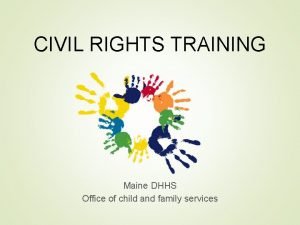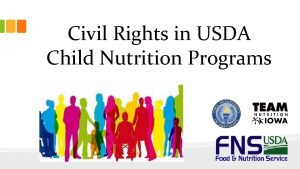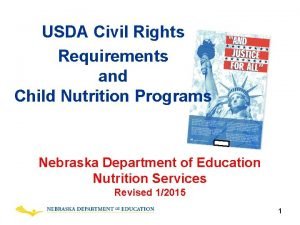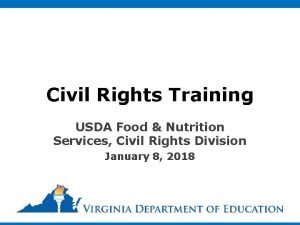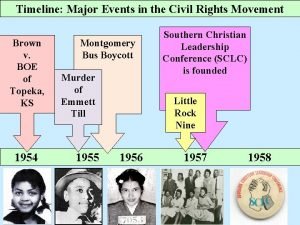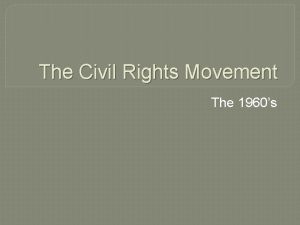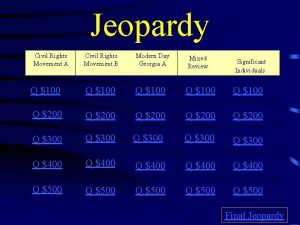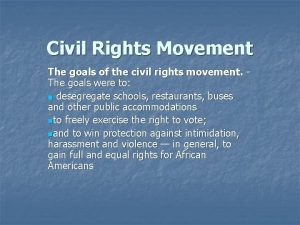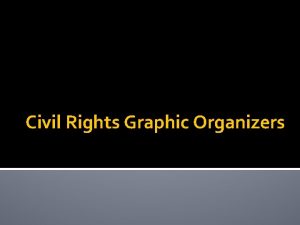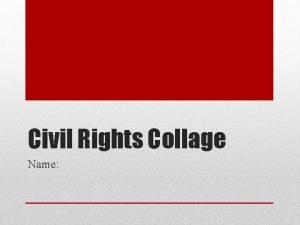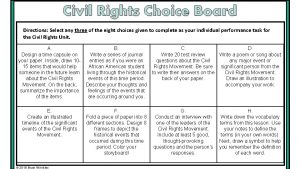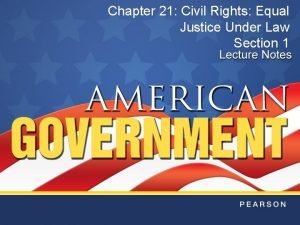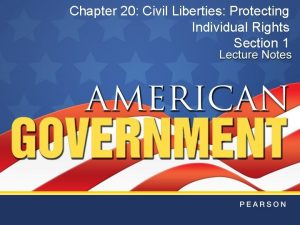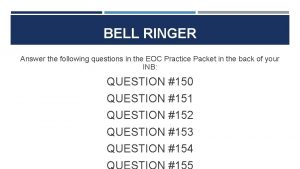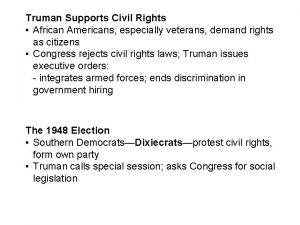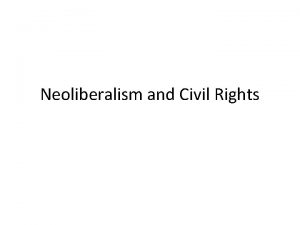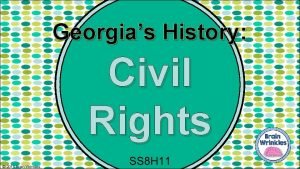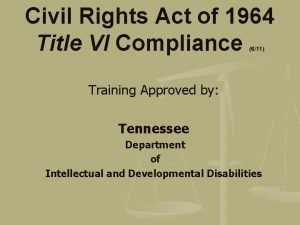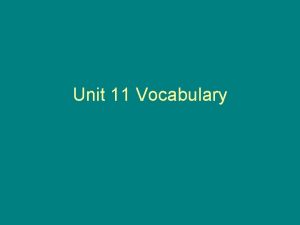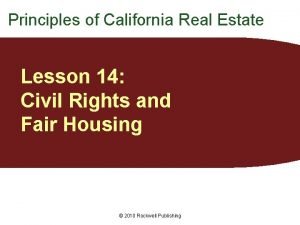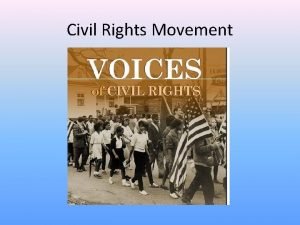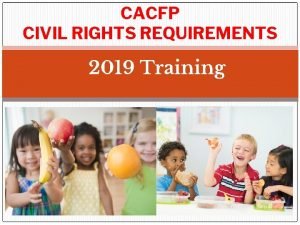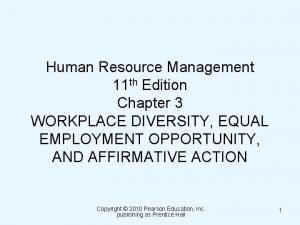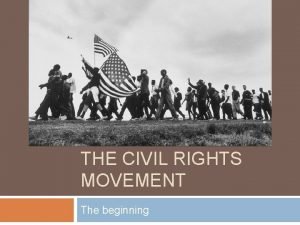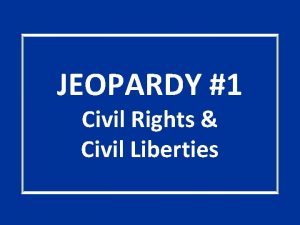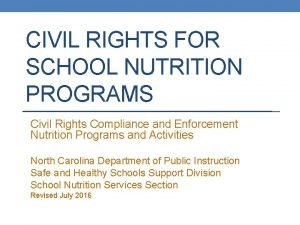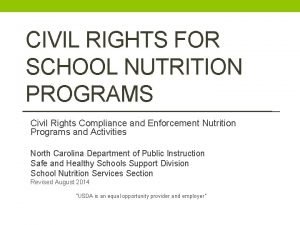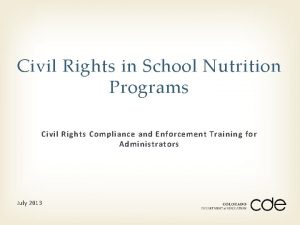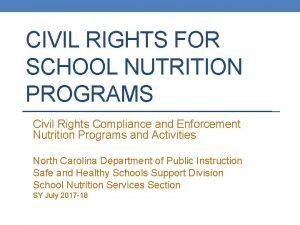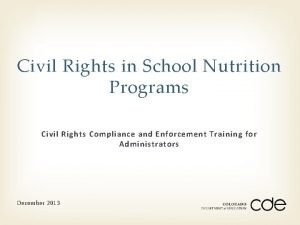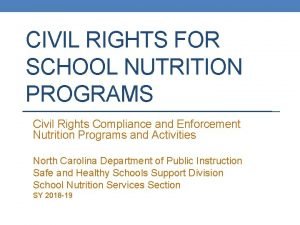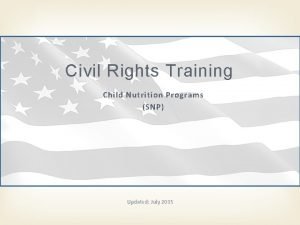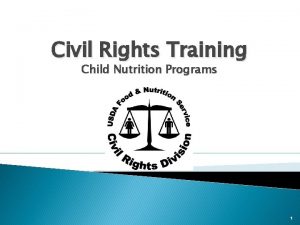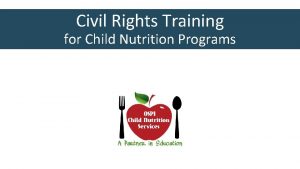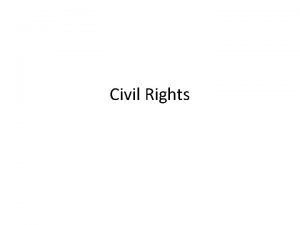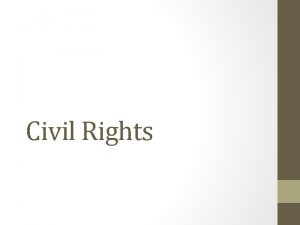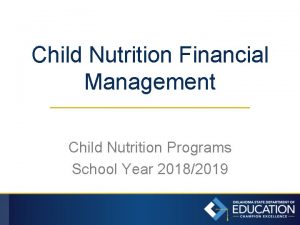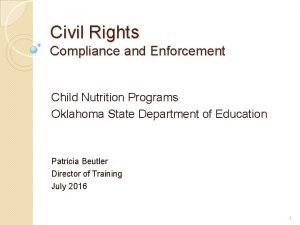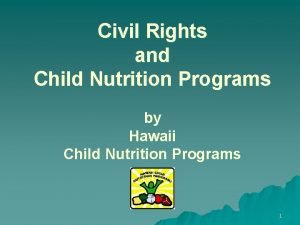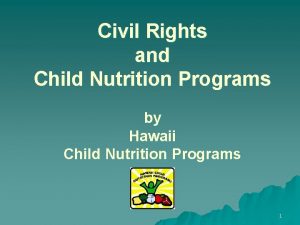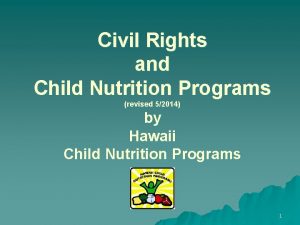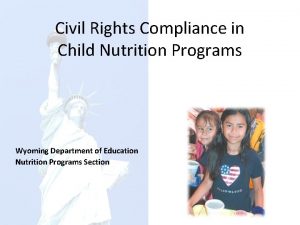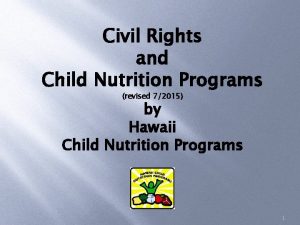Civil Rights in Child Nutrition Programs Training Purpose





































- Slides: 37

Civil Rights in Child Nutrition Programs

Training Purpose • USDA requires all Child Nutrition staff to attend civil rights training annually to prevent discrimination • This training plays a key role in providing excellent customer service 9/15/2020 2

Content Covered • Civil Rights in Child Nutrition Programs Public Notification Systems • Complaint Procedures • Customer Service • Conflict Resolution • Ethnic and Race Data Collection • Reasonable Accommodations • Compliance During a Review • Resolution of Noncompliance 9/15/2020 3

Civil Rights Regulations in Child Nutrition Programs • Civil Rights regulations direct sponsors on the proper procedures to follow so that benefits of Child Nutrition Programs are made available to all eligible persons in a non-discriminatory manner • All sponsors receiving federal money must implement Civil Rights requirements to be eligible for all Child Nutrition Programs • Food and Nutrition Services (FNS) Instruction 113 is the federal regulation governing Civil Rights in the Child Nutrition Programs 9/15/2020 4

What are Civil Rights? Civil Rights are: “The nonpolitical rights of a citizen; the rights of personal liberty guaranteed to U. S. citizens by the 13 th and 14 th Amendments to the U. S. Constitution and the acts of Congress. ” 9/15/2020 5

Goals of Civil Rights • • Eliminate barriers to program benefits Provide equal treatment to all Explain rights and responsibilities Show respect and dignity to all 9/15/2020 6

Civil Rights Laws • Title VI – Civil Rights Act of 1964 • Prohibits discrimination based on race, color, sex, and national origin – including persons with Limited English Proficiency • Title IX of the Education Amendments of 1972 • Prohibits discrimination based on sex under any education program or activity that is receiving federal financial assistance • Section 504 of the Rehabilitation Act of 1973 • Prohibits discrimination based on disability 9/15/2020 7

Civil Rights Laws cont. • Americans With Disabilities Act of 1990 • Prohibits discrimination based on disability in all services, programs, and activities provided to the public by State and local governments, except public transportation services • Age Discrimination Act of 1975 • Prohibits discrimination based on age in programs or activities receiving Federal financial assistance • Civil Rights Restoration Act of 1987 • Prohibits discrimination based on race, color, and national origin 9/15/2020 8

What is Discrimination? • Discrimination is the act of distinction of one person or a group of persons from others; either intentionally, by neglect, or by actions or lack of actions based on their protected classes • Protected classes: • • • Race Color National Origin Sex Age Disability 9/15/2020 9

Examples of Unlawful Discrimination • Giving one group or type of participants larger or extra helpings of food while not providing the same to other groups or types of participants • Serving boys larger portions than girls • Separating genders • Putting the girls separate from the boys 9/15/2020 10

Examples of Unlawful Discrimination (cont’d) • Failing to provide program information to all potential program participants • Not distributing program information in all language specific to the population of the service area such as Spanish • Failing to provide children with special needs accommodating meals 9/15/2020 11

Civil Rights Training • All staff who work with Child Nutrition Programs must receive training on all aspects of civil rights compliance annually • Specific subject matter: Collection and use of data Effective public notification systems Compliant procedures Compliance review techniques Resolution of noncompliance Requirements for reasonable accommodation of persons with disabilities • Requirements for language assistance • Conflict resolution • Customer service • • Retain training records of civil rights training 9/15/2020 12

Public Notification System Program Availability • Take specific action to inform applicants, participants, and potentially eligible persons of their program rights and responsibilities and the steps necessary for participation Complaint Information • Applicants and participants must be advised of their right to file a complaint, how to file a complaint, and the complaint procedures Nondiscrimination Statement • All information materials and sources, including websites, used to inform the public about FNS programs must contain a nondiscrimination statement 9/15/2020 13

Methods of Public Notification • Inform of program(s) or changes in program(s): • • • Eligibility Benefits Services Location of local facilities or service delivery points Hours of service • Possible methods of communication: • • • Internet Newspaper articles Radio and television announcements Letters Bulletins Newsletters All notifications must include nondiscrimination statement. 9/15/2020 14

And Justice for All Prominently Display the “And Justice for All” USDA nondiscrimination poster ü In each school ü In a location that is easily visible to the students and the public in the food service area ü Must be 11”x 17” in size 9/15/2020 15

Non-discrimination Statement In accordance with Federal civil rights law and U. S. Department of Agriculture (USDA) civil rights regulations and policies, the USDA, its Agencies, offices, and employees, and institutions participating in or administering USDA programs are prohibited from discriminating based on race, color, national origin, sex, disability, age, or reprisal or retaliation for prior civil rights activity in any program or activity conducted or funded by USDA. Persons with disabilities who require alternative means of communication for program information (e. g. Braille, large print, audiotape, American Sign Language, etc. ), should contact the Agency (State or local) where they applied for benefits. Individuals who are deaf, hard of hearing or have speech disabilities may contact USDA through the Federal Relay Service at (800) 877 -8339. Additionally, program information may be made available in languages other than English. To file a program complaint of discrimination, complete the USDA Program Discrimination Complaint Form, (AD-3027) found online at: https: //www. usda. gov/oascr/how-to-file-a-programdiscrimination-complaint, and at any USDA office, or write a letter addressed to USDA and provide in the letter all of the information requested in the form. To request a copy of the complaint form, call (866) 632 -9992. Submit your completed form or letter to USDA by: (1) mail: U. S. Department of Agriculture Office of the Assistant Secretary for Civil Rights; 1400 Independence Avenue, SW Washington, D. C. 20250 -9410; (2) fax: (202) 690 -7442; or (3) email: program. intake@usda. gov. This institution is an equal opportunity provider. 9/15/2020 16

Non-Discrimination Statement for Program Materials • Must be included in informational materials • Convey the message of equal opportunity in all photographic and other graphics used to provide program or program-related information o Enrollment Forms o Menus o Employee handbooks o Newsletters o Brochures o Parent handbooks o Print or broadcast ads o Flyers o Websites o Public release o Computer-based o Bulletins applications • Not required to be imprinted on small items where deemed impractical (cups, buttons, magnets, pens, etc. ) 9/15/2020 17

Non-discrimination Statement for Small Materials If the material is too small to permit the full statement to be included, the material will, at a minimum, include the following statement in print size no smaller than the text: “This institution is an equal opportunity provider. ” 9/15/2020 18

Complaints of Discrimination • Allegation may be based on race, color, national origin, age, sex or disability • Filed within 180 days; written or verbal • SFAs must make an effort to obtain: Name, address, and telephone number of the complainant The nature of the incident or action The basis on which the complainant believes discrimination exists The names, telephone numbers, titles, and business or personal addresses of persons who may have knowledge of the action • The date(s) during which the alleged actions occurred • • • Forward the complaint 9/15/2020 19

SFA Complaint Procedure SFAs must have a written complaint procedure. The procedure should outline: • Accepting a Complaint • Verbally and in writing • Transcribing a Complaint (complaint form can be used but cannot be a prerequisite to filing a complaint) • Collecting relevant information • Forwarding a Complaint • Agency complaints are forwarded to 9/15/2020 20

Customer Service • A school must provide equal access to all eligible participants regardless of race, color, national origin, sex, age, or disability • All participants must be treated in the same manner • Each participant receives the same menu items in the same amounts • All participants are included in meals, snacks, activities, and discussions • Participants with special needs will have their needs addressed based on the severity of the need • Standards of behavior are not based on membership in a protected class 9/15/2020 21

Conflict Resolution • Skills can help staff provide good customer service and avoid potential civil rights complaints • 5 goals: Avoid the desire to blame Improve the situation Communicate your feelings directly Improve relationships and increase communication • Avoid repeating the situation • • 9/15/2020 22

Conflict Resolution Scenario A group of high school students is unhappy about the menu served at school. They decide to write a letter to the editor of the local newspaper instead of speaking directly with the cafeteria manager. The cafeteria manager is unaware of the problem until she faces the angry principal with the newspaper in hand. Principal position: Do something about this, I don’t need bad publicity for my school! The principal schedules a meeting at 9: 00 am today with the unhappy students, the principal, and cafeteria manager. 9/15/2020 23

Racial/Ethnic Data Collection • SNP operators need to establish a system to collect racial and ethnic data • Data is used to determine how effectively your program is reaching potentially eligible children and where outreach may be needed • Now a requirement on Free and Reduced Price applications • Data must be collected on an annual basis • For schools, this data is typically collected at the time of student enrollment or by other student data systems • Sponsor collects data from Free/Reduced Priced Applications, or staff may make a visual identification of participants’ categories (i. e. Summer Food Service Program and CACFP) • Records must be kept for 3 yrs. + current year in secure manner 9/15/2020 24

Ethnic Categories • There are 2 Ethnic Categories. Choose 1: • Hispanic or Latino: persons of Cuban, Mexican, Puerto Rican, South or Central American, or other Spanish culture, or origin regardless of race • Not Hispanic or Latino 9/15/2020 25

Racial Categories • There are 5 Racial Categories. Option to Choose 1 or more • • • Black or African American Asian American Indian & Alaska Native White Native Hawaiian or other Pacific Islander 9/15/2020 26

Reasonable Accommodations - Disability • All sponsors participating in Child Nutrition Programs are required to: • Take reasonable steps to ensure meaningful access to their programs for participants with disabilities. • Provide food substitutions or modifications if a child has a dietary disability that restricts the child’s diet. • Written medical statement must be on file when a disability does not meet program meal pattern requirements. 9/15/2020 27

Reasonable Accommodations – Limited English Proficiency (LEP) Definition: Individuals who do not speak English as their primary language and have a limited ability to read, speak, write, or understand English. • Upon request, make available to the public, participants, and potential participants information about program eligibility, benefits, services, and the procedures for filing a complaint, in English and/or in the appropriate translation to non-English speaking persons • If needed, the use of alternative means of communication (Braille, large print, audiotape, etc. ) are required Refer to FNS Instruction 113 -1 pg. 10 9/15/2020 28

Administrative Review Civil Rights Compliance during an Administrative Review

Review Questions and Documents 800. What is the non-discrimination statement used for appropriate Program materials? Please provide exact language. 801. Provide a copy of the SFA’s public release. 802. Is there a need for services for LEP households? If so, what services does the SFA provide? 803. What is the SFA’s procedure for receiving and processing complaints alleging discrimination within FNS Meal Programs? If procedures are written, provide a copy. 9/15/2020 30

Review Questions and Documents (cont’d) 804. Has the SFA received any written or verbal complaints alleging discrimination in FNS Programs in the current or prior school year? 805. What procedures are in place for accommodating students with special dietary needs? Ensure regulations are followed. 806. When was the SFA’s most recent civil rights training for staff who interact with program applicants or participants and their supervisors? 807. How does the SFA collect racial/ethnic data? How often is the data collected. 9/15/2020 31

Examples of Noncompliance • Denying an individual or household the opportunity to apply for FNS program benefits or services on the basis of a protected class • Providing FNS program services or benefits in a dissimilar manner on the basis of a protected class (except as a disability accommodation) • Selecting FNS program sites or facilities in a manner that denies an individual access to FNS program benefits, assistance, or services on the basis of a protected class 9/15/2020 32

Resolution of Noncompliance • If non-compliance is indicated, corrective action must be taken immediately to achieve voluntary compliance 9/15/2020 33

Summary üProminently display the And Justice for All poster üNon-discrimination statement must be on all printed materials available to the public which mention USDA and/or Child Nutrition meals and snacks üCollect and maintain Racial/Ethnic Data annually üMake reasonable accommodations for persons with disabilities üTrain staff annually on Civil Rights and document the training üDevelop & fully implement the sponsor’s CR Complaint Procedure üMake available to all staff Civil Rights complaint form and Civil Rights Log 9/15/2020 34

Resources • CDE Office of School Nutrition Civil Rights webpage • • Civil Rights training power point for SFAs to train staff Civil Rights self-study guide for SFAs to train staff Complaint procedures template Complaint procedure minimum requirements Training agenda and sign-in sheet template Civil Rights self-assessment tool Nondiscrimination statement “And Justice for All” printable pdf • Food and Nutrition Service Instruction 113 -1 • Institute of Child Nutrition "Focus on the Customer" Training 9/15/2020 35

Questions? 9/15/2020 36

USDA Non-Discrimination Statement In accordance with Federal civil rights law and U. S. Department of Agriculture (USDA) civil rights regulations and policies, the USDA, its Agencies, offices, and employees, and institutions participating in or administering USDA programs are prohibited from discriminating based on race, color, national origin, sex, disability, age, or reprisal or retaliation for prior civil rights activity in any program or activity conducted or funded by USDA. Persons with disabilities who require alternative means of communication for program information (e. g. Braille, large print, audiotape, American Sign Language, etc. ), should contact the Agency (State or local) where they applied for benefits. Individuals who are deaf, hard of hearing or have speech disabilities may contact USDA through the Federal Relay Service at (800) 877 -8339. Additionally, program information may be made available in languages other than English. To file a program complaint of discrimination, complete the USDA Program Discrimination Complaint Form, (AD-3027) found online at: https: //www. usda. gov/oascr/how-to-file-a-program-discrimination-complaint, and at any USDA office, or write a letter addressed to USDA and provide in the letter all of the information requested in the form. To request a copy of the complaint form, call (866) 632 -9992. Submit your completed form or letter to USDA by: (1) mail: U. S. Department of Agriculture Office of the Assistant Secretary for Civil Rights; 1400 Independence Avenue, SW Washington, D. C. 20250 -9410; (2) fax: (202) 690 -7442; or (3) email: program. intake@usda. gov. This institution is an equal opportunity provider.
 Civil rights training certificate
Civil rights training certificate Civil rights in child nutrition programs
Civil rights in child nutrition programs Civil rights in child nutrition programs
Civil rights in child nutrition programs Civil rights webquest
Civil rights webquest Child nutrition food buying guide
Child nutrition food buying guide Usda civil rights training
Usda civil rights training Civil rights training quiz answers
Civil rights training quiz answers Cpmcd full form
Cpmcd full form Civil rights timeline of events
Civil rights timeline of events Civil rights sitins
Civil rights sitins Rosa parks mother
Rosa parks mother Kerner commission apush
Kerner commission apush Define civil rights
Define civil rights Civil rights movement jeopardy
Civil rights movement jeopardy Unit 7 modern ga and civil rights
Unit 7 modern ga and civil rights Goals of the civil rights movement
Goals of the civil rights movement Civil rights graphic organizer
Civil rights graphic organizer Civil rights collage
Civil rights collage Civil rights choice board
Civil rights choice board Chapter 21 civil rights equal justice under law
Chapter 21 civil rights equal justice under law Chapter 20 civil liberties protecting individual rights
Chapter 20 civil liberties protecting individual rights Civil rights bell ringers
Civil rights bell ringers Truman supports civil rights
Truman supports civil rights Characteristics of civil rights
Characteristics of civil rights Civil rights cloze notes 1
Civil rights cloze notes 1 Sibley commission definition
Sibley commission definition Title vi of the civil rights act of 1964
Title vi of the civil rights act of 1964 Civil rights movement vocabulary
Civil rights movement vocabulary Unruh civil rights act real estate
Unruh civil rights act real estate Civil rights movement webquest
Civil rights movement webquest Civil rights movment
Civil rights movment Cacfp civil rights
Cacfp civil rights Title vii of the civil rights act
Title vii of the civil rights act Title vii of the civil rights act
Title vii of the civil rights act The civil rights movement
The civil rights movement Civil rights jeopardy
Civil rights jeopardy Civil rights movement essential questions
Civil rights movement essential questions Chapter 14 postwar prosperity and civil rights
Chapter 14 postwar prosperity and civil rights
